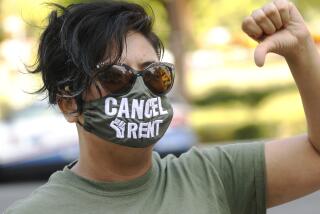Move to Ban Gangs From Parks Rejected : City Council: The LAPD voices opposition and measure’s constitutionality is questioned. The ordinance will be reconsidered Friday.
- Share via
An attempt to enact a law barring gang members from Los Angeles’ parks, beaches and playgrounds was derailed in the City Council on Wednesday after a heated debate in which the Police Department registered its opposition to the proposal.
Supporters of the law, led by Councilman Ernani Bernardi, portrayed it as a desperately needed tool to decrease spiraling gang violence, particularly in city parks. They cited the success of a similar, though narrower, measure used to rid a San Fernando park of two warring gangs.
The San Fernando ordinance gave rise to similar measures in Pomona and Bell Gardens and interest from gang-plagued communities throughout the country.
Los Angeles City Council members who opposed the citywide proposal called it unnecessarily restrictive, constitutionally suspect and contrary to the spirit of community-based policing.
“Our continuing to restrict (young people’s) choices is not the right direction,” Councilman Mike Hernandez said. “We’re wasting a lot of time trying to exclude.”
Councilman Mark Ridley-Thomas, who led the opposition, sought to substitute a measure that would have directed police to develop other strategies to deal with gangs congregating in public places, including putting mobile police substations in problem areas.
Ridley-Thomas’ measure was defeated. A portion of it was tacked onto Bernardi’s proposal by Councilwoman Ruth Galanter as an attempted compromise, but the amended version fell one vote short of the eight required for approval.
The matter, however, is scheduled to be reconsidered Friday.
Under Bernardi’s proposal, gang members who commit two or more serious crimes--such as homicide, assault or auto theft--would be prohibited from being at any park, beach or playground. Violators would be subject to a fine up to $1,000 and six months in jail. Police, however, would have to show that the person came to the area with the intent of committing a crime.
Bernardi sought the proposal after the San Fernando law, enacted in 1991, proved successful in keeping specified gang members out of Las Palmas Park, where a woman and her children had been shot in a cross-fire.
Lt. Rico Castro of the San Fernando Police Department said Wednesday that San Fernando officials had considered, but rejected, a citywide ban because of constitutional considerations.
The American Civil Liberties Union of Southern California filed a lawsuit challenging the San Fernando law on constitutional grounds, but withdrew it when the measure expired last year.
Paul Hoffman, the ACLU’s legal director, said Wednesday that the requirement in the Los Angeles proposal calling for proof of intent to commit a crime improves its constitutionality. He added, however, that the measure seems superfluous.
“There are other laws that deal with criminal activity in parks and anywhere else for that matter,” Hoffman said. Moreover, he said, such a measure would be unenforceable and open to abuses.
“How do you identify who are the gang members and how do you tell they are going to a park with a specific intent to commit a crime?” he asked.
During the City Council debate Wednesday, LAPD Cmdr. John White raised questions similar to Hoffman’s.
“I have some real difficulties with this law,” White said. “I’m afraid this one will create more problems than it will solve.”
Patrol officers, who would be responsible for arresting violators, are not trained to identify gang members, White. said. Worse, he said, they would have to prove in court that the person intended to commit a specific crime.
“That is virtually impossible,” White said. “Although we need to do something about the high incidence of gang violence, I don’t think this particular ordinance is going to give us the tool we need.”
White’s responses left Bernardi visibly angry. “I think this is very shortsighted,” he said. “There are many ordinances on the books that we can’t enforce.”
Maureen Siegel, chief of the criminal division of the city attorney’s office, deferred to the Police Department when a council member asked if her office supported Bernardi’s proposal.
“As drafted we feel that the law is defensible,” Siegel said in a later interview, “But the council is obviously getting a different message from the Police Department.”
More to Read
Sign up for Essential California
The most important California stories and recommendations in your inbox every morning.
You may occasionally receive promotional content from the Los Angeles Times.










